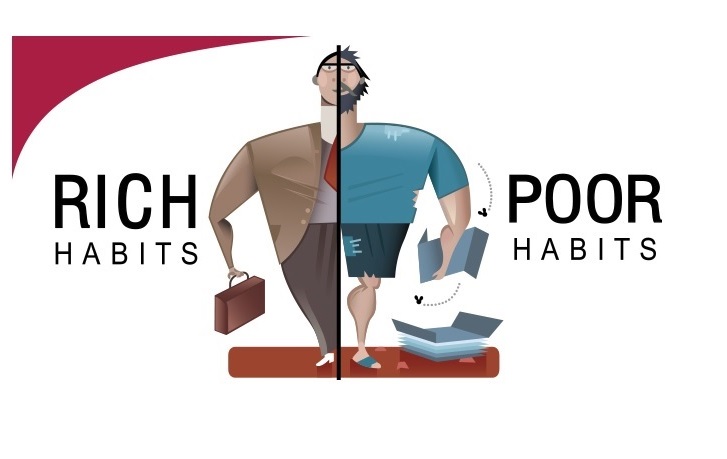Since 2004, I’ve been immersed in studying what to do and what not to do in order to become wealthy and avoid poverty. From my Rich Habits Study and my ongoing Rich Habits research, I’ve learned an enormous amount about what it takes to become wealthy.
Thanks to my research, I made two monumental discoveries:
Habits Matter – Your daily habits have a great deal to do with your financial circumstances. Some habits lift you up and help you grow wealth, while others drag you down and could put you in the poor house. The habits that lift you up, I call Rich Habits. The habits that drag you down, I call Poor Habits.
There are Four Paths to Wealth – Saver-Investor Path, Big Company Climber Path, Virtuoso Path and the Entrepreneur Path. Each path requires forging different Rich Habits and the path you take must be in alignment with your individual personality profile.
The existence of four paths to building wealth is, I believe, the most important discovery I’ve made thanks to my research.
What’s so profound about the four paths to wealth?
When you choose a path that is right for you, building wealth becomes almost automatic. Conversely, if you choose a path that is not right for you, building wealth becomes almost impossible. This explains why so many struggle to build wealth – they are following the wrong path.
Recently, I’ve been spending quite a bit of my time in explaining how the Saver-Investor path works, due in large part to the release of my latest book, Effort-Less Wealth, which was written specifically for those who are interested in following the Saver-Investor path to creating their wealth.
What makes this path so special is that it is the only path that is available to almost everyone:
The Saver-Investor Path does not require any unique set of skills – You don’t need to be born with unique innate talents and you don’t need to devote years to honing some special skill.
The Saver-Investor Path requires no special knowledge – You don’t need to get a PhD or attend an expensive graduate school. You don’t need to go to an expensive college and you don’t need to even go to college at all.
The Saver-Investor path does not demand that you take significant risks – You don’t have to go into debt or put up the equity in your house in order to become rich.
The Saver-Investor Path does not require that you work long, oppressive work hours. and
The Saver-Investor Path does not force you to isolate yourself from your family and friends in the pursuit of wealth.
The Saver-Investor Path is not only the easiest path to building wealth, it is also the guaranteed path to building wealth. But this easy, guaranteed path does have four requirements:
Middle-Class Income – It’s hard to save when you are poor. Most of the poor are barely able to meet the costs of even a low standard of living. But, if you have a middle-class income and keep your standard of living low, this will give you the ability to save. And you need to save before you can invest.
Discipline – The typical Saver-Investor saves 20% or more of their income and lives off what’s left. This requires discipline in saving first and discipline in minimizing how much money you spend, so that you can save.
Consistency – Saver-Investors consistently save and consistently invest their savings so that their wealth can grow every year.
Time – The typical Saver-Investor in my Rich Habits Study consistently saved and prudently invested their savings over an average of 32 years. So, if you want to build wealth as a Saver-Investor, you need to begin doing so while you’re in your 20’s or early 30’s. If you start later in life, and still desire to retire wealthy, you will have to increase your savings rate by 10% for every ten years you failed to save. And you will have to work longer. For example, if you decide to pursue the Saver-Investor Path in your mid-thirties, you will have to increase your annual saving to 30% of your net income and work into your mid-sixties. If you start in your mid-forties, you will have to increase your annual savings to 40% of net income and work into your mid-seventies.
In my Rich Habits Study, the Saver-Investors accumulated an average of $3,260,000 over an average of 32 years.
Everyone’s life is a series of stages: childhood, primary school, secondary school, college for some, getting your first apartment, marriage, starting a family, buying your first family home, managing your growing family, balancing work and family while managing your career, empty nest stage and finally, the retirement stage.
Money mistakes you make in one stage can have a ripple effect, impacting one or more subsequent stages. Make too many money mistakes in any stage and you will find yourself in perpetual catch-up mode, the rest of your adult life.
Those who make the right decisions at every stage, prime themselves for financial success. In my latest book, Effort-Less Wealth, I explain exactly what you should be doing at every stage of your life in order to achieve financial success.
One of the prerequisites for the Saver-Investor Path is getting into the habit of saving 20% or more of your net pay. This requires that you maintain a cost or standard of living that is equal to 80% or less of your net pay. So, by saving 20% first, this “pay yourself first” strategy automatically forces you to live off of the remaining 80%.
Saving 20% first, defaults you into a standard of living that you fund with the remaining 80% of your income.
So if you want to grow your wealth as a Saver-Investor you must be able to save. And, in order to save, you must adopt some Financial Growth Habits.
What are some of these Financial Growth Habits?
#1 Be Frugal Not Cheap
People often confuse being frugal with being cheap. There’s a huge difference.
Let me give you an example.
Cornelius Vanderbilt, the richest man in the world in the late 1800’s, controlled much of America’s transportation in two sectors – the steamships and the railroads. He was revered for his ability to minimize costs. His attention to financial details was unsurpassed during his reign. For example, when he took over the New York Central Railroad, one of the first things he did was remove all of the brass from all of the trains. This cost him a lot of money in removing all of the brass from his rail cars. People thought he was crazy.
Why did he do it?
Brass needed to be polished every day. Removing the brass meant Vanderbilt no longer needed to pay brass polishers. Eliminating the expense of polishing the brass far and away exceeded the cost of its removal, saving his railroad companies an enormous amount of money in the long run.
Cornelius Vanderbilt was frugal.
Frugal and cheap have nothing in common. Being frugal with your spending means spending your money wisely. Frugal spenders make a habit of buying the highest quality product or service, at the lowest price possible. They focus on quality first and cost later.
Cheap spending means buying the cheapest product or service, with little to no regard for quality. Cheap spending is a Poor Money Habit because you ignore quality and, instead, wind up purchasing cheap, poor quality products or services.
Cheap products break down after just a few years, forcing you to replace those products over and over again.
Cheap services are typically provided by those who are either inexperienced in their field, or who are not very good at what they do. This lack of experience or lack of competence can result in mistakes that cost you money down the road.
The costs of cheap spending are one of those taxes the non-wealthy pay that the wealthy don’t pay.
On its own, being frugal will not make you rich. It is just one piece to the Financial Growth Habits puzzle, and there are many pieces, which I will cover. Frugal Spending will enable you to increase the amount of money you can save. The more you are able to save, the more you’ll have to invest.
#2 Keep Your Spending in Check
In order to invest, you must first save. In order to accumulate savings, you must keep your spending in check. The Saver-Investor self-made millionaires in my Rich Habits Study accumulated their savings by sticking to the following spending guidelines:
Housing – 25% or Less of Monthly Net Pay – For most, a home or apartment is the most expensive part of the spending budget. When you keep the size of your home or apartment small, it will reduce how much you spend in mortgage interest, rent, real estate taxes, repairs, utilities and insurance. Strive to keep your housing costs below twenty-five percent of your monthly net pay.
Cars – 5% or Less of Monthly Net Pay – Car expenses include monthly car payment, car insurance, gas, tolls, registration fees, repairs and maintenance.
Clothing – 5% of Less of Monthly Net Pay – Many Goodwill stores carry high quality clothing. You may have to spend a few extra bucks on tailoring, but it is well worth the additional cost.
Vacations – 5% or Less of Monthly Net Pay – The Saver-Investor Millionaires in my study did not go on exotic vacations. They took modest, inexpensive vacations. They found bargain vacation deals for their family. Some purchased rental properties in beach towns, skiing area or lakes, and spent their vacations in those homes.
Entertainment – 10% or Less of Monthly Net Pay – This category includes bars, restaurants, movies, music, books, gifts, etc. Eating out and any prepared food you purchase is part of your entertainment budget.
Stick to BYOBs – There are many restaurants that do not sell alcohol, beer or wine and allow you to bring your own spirit of choice into their restaurant. Restaurants markup liquor sales by as much as one hundred percent, so BYOBs save you money.
Bargain Shop – Far too many make spontaneous purchases, paying much more than they otherwise would. That’s a Poor Habit. Shopping for bargains and taking advantage of sales events are smart money habits.
Use Coupons – Even the wealthy in my Rich Habits Study engaged in this money savings habit. Thirty percent of the rich in my study used coupons to buy food. Why pay more than you have to on groceries or other expenses?
Never Gamble – Gambling is high-risk speculation. It is a tax on the poor. However, if you like to gamble, this would come out of your Entertainment category of spending.
Getting control of your spending is not an easy task. Once it becomes a daily habit, however, it gets much easier. You will fall into a pattern and a routine that will keep you out of the poor house, enable you to save and put yourself on the path to growing your wealth.
#3 Avoid Want Spending
Want Spenders spend more money than they make on their wants. They surrender to instant gratification, eschewing saving in order to buy things they want now: 60 inch TVs, nice vacations, expensive cars, bigger homes and jewelry.
Want Spenders routinely spend too much money at bars and restaurants. Worse, they incur debt in order to finance their standard of living.
Want Spenders create their own poverty. They are undisciplined with their money. They have been brainwashed by advertisers and a consumerist society into buying things they do not need.
When Want Spenders are no longer able to work, due to old age, they live out the remainder of their lives in abject poverty. They become dependent on their children, other family members, friends, the government or the charity of others.
#4 Avoid Emotionally-Driven Spontaneous Spending
When you allow emotions to influence your spending decisions, you can fall into the trap of Emotional Spending.
When you are feeling overly optimistic about your future income, you can fall into the trap of spending money you have or spending future money you expect to receive by incurring debt.
When you feel sad or depressed, emotional purchases can act like a salve, temporarily lifting you out of sadness.
The remedy is to be constantly vigilant regarding your emotions. Be like Spock – control your emotions. This keeps your prefrontal cortex in control of your brain.
#5 Avoid Spontaneous Spending
Everyone has about 3 hours of Willpower Energy. Willpower Energy is greatest after a good night’s sleep. When willpower is high, your prefrontal cortex is in complete control of your brain. When willpower is low, your prefrontal cortex gives up control to the amygdala and you lose discipline over your spending.
This is why supermarkets place products at the checkout lines. They know that you have depleted your Willpower Reserves, and that you are suffering from Decision Fatigue. Their hope is, in your weakened state, you’ll make a spontaneous purchase.
The remedy is to shop immediately upon waking up from a night’s sleep, after taking a nap or after a light meal. These three things restore your willpower reserves.
#6 Avoid Lifestyle Creep
When you increase your spending to match your increased income, you are falling victim to Lifestyle Creep.
Lifestyle Creep is typically incremental. You incrementally, over many years, increase your spending, as your income rises, without consciously realizing it.
The remedy is to fix your savings rate. Example, saving 20% of your income, always. This acts as a buffer, preventing you from spending too much and keeping you on track with growing your wealth.
#7 Do Not Supersize Your Life
When Connor McGregor fought Floyd Mayweather in 2017, he received a $30 million guarantee. Upon receipt of his guaranteed money, he purchased a $17 million yacht. Because he didn’t have enough money left over from the guaranteed money to pay his income taxes, he had to withdraw money from existing wealth to pay the tax man.
Supersizing Your Life is driven by excessive optimism driven by a sudden increase in income or wealth. Example: large bonus, significant raise, inheritance, etc.
The remedy? Same house, same spouse, same car. Refuse to upgrade your life when your income or wealth rises significantly. Have a plan and stick to it.
#8 Surround Yourself with Saver-Investors
The Saver-Investors in my Rich Habits Study intentionally surrounded themselves with friends who shared their Savings Mindset.
Why is this important?
Habits spread like a virus throughout your social network. If your inner circle includes too many spenders, you will eventually become infected by their spending habits and will be unable to save.
Becoming wealthy, as a Saver-Investor, is not an event. It’s a process. By adopting Financial Growth Habits, you put wealth-building on autopilot.




























